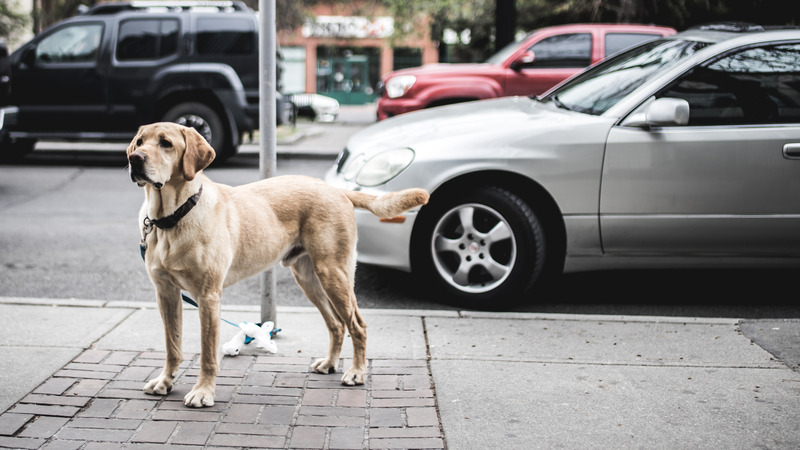
We will list the essential regulations of 50 states in regard to the status of Service Dogs in Training (SDiT).


In many of our articles, we explained the meaning of the term “service animal” as well as the regulations for service animals . Under ADA a service animal is: “a dog that has been individually trained to do work or perform tasks for an individual with a disability. The task(s) performed by the dog must be directly related to the person's disability”. If you have a dog that you would like to train for a service dog, you may want to know what its status is
- Will a service dog in training have the same rights as a trained service animal?
- Are service animals in training considered service animals under the ADA?
Under ADA service animals in training are not considered service animals. A dog must be trained in order to be granted access to public spaces.
An interesting fact we need to mention is that the following states accept miniature horses or police horses as service animals: Arizona, Florida, Illinois, Iowa, Michigan, Mississippi, Nevada, New Mexico, Ohio, Tennessee, Washington, Wyoming
We will list the essential regulations of 50 states in regard to the status of Service Dogs in Training (SDiT).
Alabama laws cover SDiT. According to the state laws if you are an individual who trains a service animal you should have the privileges that a person with a disability has.
If an individual, who is accredited by a school for guide dogs for persons with sight impairments, trains a dog, that dog should be granted public accommodation. If there is a violation of these rights a penalty of no more than $50 will be charged.

It is a violation of the SDIT laws of Alaska if an individual, accredited to train a service dog, is being denied access to public spaces while accompanied by the animal, while it is still in training.
“A person commits the offense of interference with the training of a service animal if he or she intentionally prevents or restricts a person who is authorized to train a service animal from being accompanied by an animal that is identified as being in training to be a service animal”.
“In training to be a service animal" means being in the pre-training or training period as required under a program administered through a school, agency, or other training facilities for service animals whose goal is to certify the animal as being able to assist physically or mentally challenged persons”.
An important detail of the Arizona laws is that not only dogs but miniature horses as well are accepted as service animals. They must be trained or to be in training to perform specific tasks that help a person with a disability. The tasks or work that will be performed must be directly related to this disability. Other species except the mentioned above will not be qualified as service animals.
As it becomes clear from the way Arizona’s law determines a service animal, a Service Dog In Training should have the same rights as a trained service dog. If a person with a disability or a dog trainer needs to bring an animal in public spaces due to training purposes, that person may not be denied an access.
In accordance with the laws of Arkansas, if a person has physical disabilities (i.e. sight or hearing impairments) or is a trainer during the training process of a service dog, that person may not be charged additional fees due to the presence of the animal.
Individuals accompanied by service dogs in training must be granted access to public spaces for training purposes and may not be requested to pay additional fees for the animal. These individuals must be:
-accredited to train guide dogs for persons with sight impairments;
-licensed to train signal dogs for persons with hearing disabilities;
-authorized to train service dogs for the benefit of persons with a disability.
It is important to mention that animals must be walked on a leash and tagged as service dogs.
The identification can be provided by: “the county clerk, animal control department, or other agency, as authorized by Chapter 3.5 (commencing with Section 30850) of Title 14 of the Food and Agricultural Code”.

The law in Colorado in regard to the SDIT is identical to the laws mentioned above, as persons with disabilities or trainers of service animals may be accompanied by the animal in training in public spaces and to not be charged any additional fees for the animal. The state specifies these pubic spaces and divides them into four categories:
- places of employment, housing, or public accommodation;
- programs, services, or activities provided by public entities;
- public transportation services;
- any other public spaces.
The state laws guarantee the rights to access of individuals who train a dog for assistance to people with visual, mobile or hearing impairments to public accommodations, amusement, or resort. It will be considered a violation of the law if equal access has been denied.
All spaces open to the public must allow persons who train a service animal equal access to all public accommodations.
All individuals while engaging in the training of a service animal have the same access rights to public spaces as the persons accompanied by service animals.
We need to mention that both privileges and liability for any damages that an animal may cause, are provided to these individuals.

According to the state laws, if an individual is involved with the training of a service dog for the benefit of a person with a disability, that individual must have the same right to be accompanied by the animal. In order for these rights to be granted, an individual must be certified as an agent or employee of a school for service dogs including guide dogs, hearing or seeing-eye dogs.
The laws in Hawaii do not cover Service Dogs in Training. The laws in Hawaii state, that a service animal is “any dog that is individually trained to do work or perform tasks for the benefit of an individual with a disability, including a physical, sensory, psychiatric, intellectual, or other mental disability”.
Other species will not be accepted as service animals.
Laws in this state make it clear that the emotional support or comfort provided by Emotional Support Animals can not be deemed work or tasks, related to the individual’s disability.
In case that a person with a disability is engaged in the training of a dog in order to become a service dog, may not be denied access from public places, if the presence of the dog is a part of its training and or socialization.
The same rights must be also granted to a person, who is a trainer of a dog as a service dog and is accompanied by the animal in public spaces due to training purposes.
Similar to the laws in California, laws in Idaho allow a person who is accompanied by a service dog to be requested to provide an ID card. The card needs to be licensed by a recognized school for service dogs or by an organization engaged with activities related to persons with disabilities.
You need to keep in mind that SDIT in Idaho must be tagged in order to be recognized.
Trainers of dogs as service dogs including guide dogs, hearing and seizure-alert dogs, should have access rights to all public spaces without being charged due to the dogs’ presence. If an SDIT causes damage to establishments and facilities its trainer will be liable for it.
If a person is engaged with the training process of a dog as a service animal, they must be allowed in public spaces.
If an individual is:
- a person with a disability;
- a person who is controlling a service animal for the benefit of an individual with a disability
- a person who is controlling an SDiT;
- a person who is engaged in the training of a service animal,
He/She may be allowed in public spaces without being required to pay additional charges due to the animal’s presence whether a service animal or an SDIT.
If an individual is a certified trainer from a recognized training school/organization, they may not be denied access to public spaces when accompanied by a SDiT during the training process.
Identical to the laws mentioned above Kentucky also guarantees access rights to public spaces individuals including trainers of assistance dogs
According to the Kentucky laws, a service animal can be:
"Bomb detection dog," "Narcotic detection dog," "Patrol dog" (a dog that is trained to protect a peace officer and to apprehend a person); "Tracking dog" (the dog that is trained to track and find a missing person, escaped inmate, or fleeing felon); "Search and rescue dog," "Accelerant detection dog," "Accelerant detection dog," (a dog that is trained for accelerant detection, commonly referred to as arson canines); "Cadaver dog," "Assistance dog," (a dog that is trained to meet the requirements of KRS 258.500);
This state also qualifies a service dog as a dog who has been trained or who is in process of training to perform specific tasks in order to help a person with a disability. With that in mind, we can affirm that a dog trainer or raiser of an SDIT has the right to access public spaces equal to the rights of individuals with a disability accompanied by service animals.
According to the state laws, a service dog trainer during the training process of the animal has public access rights and responsibilities equal to the privileges and responsibilities of a disabled person (visual, mental, or physical impaired) accompanied by a service dog.
The state laws determine a “service animal trainer” as an individual who can be either a professional or a volunteer, who provides a training or raises a service animal for the benefit of persons with disabilities. Trainers of service animals when accompanied by the animal during the training process may be granted access to all places open to the public.
A person who is training or raising a service dog (including a guide, hearing, or assistance dog), accompanied by the animal, must have the same privileges and responsibilities as individuals with a disability in accordance with ADA regulations.
There is also a special clarification in the state’s law:
“Also, a person engaged in the hearing dog business, while actually engaged in the training process and activities of hearing dogs, shall have the same rights, privileges, and responsibilities with respect to access to public facilities as those applicable to deaf persons”.
The laws in Michigan did not cover Service Dogs in Training prior to May of 2022. Fortunately, bill number 4256 was passed on May 12th, 2022 in regards to the Public Acts of 2022 which directly discusses the rights of service animals. It includes the following:
"A service animal in training must be under the control of the animal raiser or trainer and must have aharness, leash, or other tether. If the use of a harness, leash, or other tether would interfere with the animal’ssafe and effective performance of work, tasks, training, or socialization, the service animal in training must beotherwise under the control of the animal raiser or trainer."
According to the law definition of a service animal in Michigan, a miniature horse also can be qualified as a service animal.
The laws in Minnesota cover SDIT and grant access to public accommodations to any person who is engaged in the training of a service dog. This person should be also responsible for any damages that the service animal in training may cause to establishments and facilities.
Mississippi laws allow individuals, who are trainers of support animals and are accompanied by a service animal in training to have the same access rights to all public facilities and accommodations as persons with a disability have. These can be persons with mobility, sight, hearing impairments or veterans with PTSD)
The state laws clarify the term “support animal trainer”. This is a person whether a professional or a volunteer with a professional trainer, who is engaged in the training or raising a support animal for the benefit of an individual with a disability.
The laws in Missouri cover Service Dogs in Training and verify that a trainer licensed by a recognized training center as well as any member of a service dog team may have access to public premises while engaged in the training of the animal. No extra fees may be charged due to the presence of the animal, but this person- trainer or a member of a service dog team, is responsible for any damages that the animal may cause.
The laws in the state cover Service Dogs in Training. An individual with a disability is allowed to be accompanied by a trained service dog as well as with a service animal in training with identification. This individual needs to be granted access to public spaces without any extra fees to be charged due to the presence of the animal.
If an individual is a service dog trainer, this individual may be accompanied by the animal while in training in public spaces. This person may not be required to pay additional charges for the service animal.
A person who is training a service animal and is accompanied by the animal during the training process may not be denied access to public accommodation or services. An employee of the place of public accommodation, while training a service animal, may not be denied access to this place of public accommodation or any place, open to employees. This rule applies whether the place is open to the public or not.
If a person is a service animal trainer, this person should be granted the same rights and responsibilities as a person with a disability. This individual may have access to public establishments and facilities and is responsible for any damage caused by the animal.
In accordance with the New Jersey laws, a trainer of a service or a guide dog during the training process of the animal should have the same privileges as well as liability as individuals with a disability.
First, we need to mention that according to the laws in New Mexico as a qualified service animal will be accepted as a qualified service dog as well as a qualified service miniature horse. A service animal can be trained or be in the training process of becoming a service animal. The state laws grant access to public spaces and all common carriers to an individual with a disability, who is accompanied by a qualified service animal. The animal should be walked and controlled by a trainer, an owner, or a handler.
Similar to the laws mentioned above, the laws in New York guarantee the same rights and responsibilities of a person who is certified to train service dogs during the training process as the rights of a person with a disability.

The laws in this state allow the presence of a service animal in training in public spaces if the training process requires its presence. The animal in training should be accompanied by a trainer and also be identified with one of the following devices: leash, harness, collar, or cape.
In North Dakota, a service animal trainer while accompanied by the animal in training may have access rights to “any place of public accommodation, common carrier, facility of a health care provider, and any place to which the public is generally invited”. Additional charges may not be processed because of the presence of the animal in training.
However, there are some additional requirements that a trainer of an SDiT should consider:
The on-premise manager should be informed about the presence of a service animal in training on the premises’ territory;
The animal trainer should be identified via a photo card, provided by a training program with a national recognition;
The animal trainer is responsible for any damage that the animal in training may cause to the establishments or facilities.
The laws in Ohio cover Service Dogs in Training and guarantee public access rights to persons with a disability (visual, hearing, or mobile impairments) as well as trainers of assistance animals.
A person, who has a physical disability, who is visually or hearing impaired, and is accompanied by a service dog, including a guide dog and a signal dog, may be granted access to places of public accommodation. The same rule applies to a trainer of a service dog, licensed by a recognized training center, while engaged in the training process of the animal.
An individual with a disability or a trainer of an assistance animal may not be prohibited from areas open to the public or to business invitees, provided by places of public accommodation, as well as places of government services, activities, or programs, while these individuals and/or trainers are accompanied by an assistance animal or an assistance animal in training
If an individual with a disability is using a service dog, including a guide or support dog, or an individual is engaged in the training of such a dog for the benefit of a person with a disability, this individual should be granted access to public accommodations, facilities, and privileges. Otherwise, it would be deemed a violation of the laws of the state, and the person who denies access to public spaces to the individuals mentioned above will be charged as “guilty” of a summary offense.
A trainer or an individual engaged in the raising of an assistance animal may be granted the same rights as a person with a disability.
The laws in this state guarantee public access rights and responsibilities to an individual, who is a trainer of an assistance animal, including a guide dog, during the training process. These privileges and responsibilities should be identical to the rights and responsibilities of persons with a disability.
Accoding to the state laws in SD a service animal trainer is allowed to be accompanied by a service animal in training, who wears a collar and leash, harness, or cape "that identifies the animal as a service animal in training, in any of the places listed in § 20-13-23.1 subject to any conditions and limitations established by law and applicable to service animals, without being required to pay an extra charge for the service animal in training".
An individual who is engaged in the training of dog guides may be granted access to places of public accommodation, recreation, or amusement. That means that neither an owner nor an employee of such a place of public accommodation may deny access or use of accommodation to this individual. The SDIT should be identified with a harness and walked on a leash. The trainer of an SDiT should hand over documentation, provided by a licensed school for training dog guides, in order to be inspected.
The laws in Texas do cover Service Animals in Training. An SDiT may not be denied access to public spaces, while accompanied by a certified trainer.
Even when a person is not a person with a disability, they have the right to be accompanied by an animal during the training process of this animal to become a service animal, including a police service dog.
The laws in Vermont cover Service Dogs in Training, and they guarantee access right to public accommodation to all persons who are: either persons with a disability, accompanied by a service animal, or persons who are engaged in the training of an animal to become a service animal for the benefit of an individual with a disability.
Laws in Virginia cover SDiT and apply to individuals who are accompanied by SDiT and fulfill the following requirements:
A dog in training should be at the minimum age of 6 months, it should be in the harness that proves that the individual who is accompanying the dog, is a certified trainer of guide dogs or is engaged in the continuing training of a guide dog.
An animal in training should be walked on a blaze leash in orange as proof that the individual, who is accompanying the animal is either a trainer of hearing dogs or is engaged in the current training of a hearing dog.
A dog in training should be in a vest, harness, or backpack as identification that the animal is a trained service dog. The dog should be accompanied by a person, who is an experienced trainer of service dogs is currently providing a training of a dog to become a service dog.
A dog should wear a jacket as verification of the hearing or service dog organization or guide. It is considered a proof that the guide is a certified trainer or the organization identified due to the jacket.
The laws in Virginia in regard to the SDIT apply also to individuals who are part of a three-unit service dog team and are providing a continuing training of a service dog.
The interfering with a service dog or a guide dog law states that:
A Guide Dog is a dog that has been trained or is being trained as a service animal for the benefit of individuals with visual or hearing impairments.
As a Service Animal is considered an animal that has been trained or is in training process in order to be able to provide help persons with a sensory, mental or physical disability.
The laws of Virginia in regard to service animals also apply to individuals who are recognized trainers of service animals during the training process.
A person with a disability or a trainer, may not be denied access to or use of any place of public accommodation or amusement when accompanied by a service animal.
It is important to mention that these regulations apply to a service animal only if the animal is identified with a leash, harness, or a special cap.
The laws in this state do not cover Service Dogs in Training. An important fact in regard to the definition of the term “service animal” is that miniature horses have been accepted as service animals as well.


Dani Graymore is a Certified Dog Trainer with over 10 years of experience in the field. She currently teaches assistance dog training classes at one of the SDTSI onsite schools in Plovdiv, Bulgaria. Dani specializes in working with reactive dogs and addressing behavioral issues, with a particular passion for teaching scent work. She is a proud member of the Guild of Dog Trainers and a Professional Member of the Pet Professional Network.